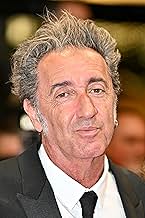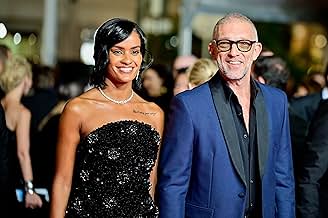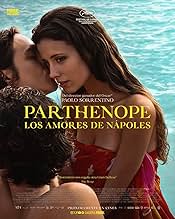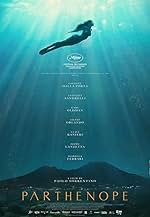- Premios
- 7 premios ganados y 25 nominaciones en total
Antonio Annina
- Raimondo 10 anni
- (as Antonino Annina)
Maria Rosaria Bozzon
- Vecchia megera
- (as Mariarosaria Bozzon)
- Dirección
- Guionista
- Todo el elenco y el equipo
- Producción, taquilla y más en IMDbPro
Resumen
Reviewers say 'Parthenope' by Paolo Sorrentino is visually stunning with breathtaking cinematography and beautiful Naples scenery. It explores themes of beauty, youth, love, and self-discovery. Celeste Dalla Porta's performance is praised for its allure and enigmatic quality. However, the film has mixed reviews, with some finding it pretentious and lacking substance, focusing too much on aesthetics. The narrative structure and character development are contentious, with some appreciating the philosophical approach and others finding it incoherent and shallow.
Opiniones destacadas
Paerthenope isn´t just a film, it is a painting alive: every scene is filmed with such sensibility... If you wonder what real Beauty is, then the film will give you the answer. A real masterpiece in my opinion, that will make you fall in love with the main actress (you can´t escape that !) but also with the beautiful city of Napoli, a city filled with culture and history, the heart of the Italian authenticity. A film that takes you for a walk through essential philosophical questions such as the true essence of Beauty and the ephemeral youth. To put it into a nutshell, I would say Parthenope is a BEAUTIFUL DEPRESSING movie.
Along the lines of the legendary beauty Aphrodite, "Parthenope" (Celeste Dalla Porta) was born in the sea and grew to become a great temptress to both of her male contemporaries. The first being her obsessed brother "Raimondo" (Daniele Rienzo) and the other her adoring childhood friend "Sandrino" (Dario Alta) whose unrequited love for her drove him to distraction. Not, however, to such distraction as that of her sibling, It's when the trio decide to head for an unfunded trip from their home in Naples to the nearby island of Capri that she meets elderly American writer/dipso "Cheever" (Gary Oldman) who finds her intriguing but appears to have a certain immunity to her charms and she's not used to that. Whilst on this carefree trip there befalls a tragic realisation that causes all of them to appreciate the stark realities and fickle shallowness of their lives and brings into focus senses of grief, rejection and emptiness. It's a beautifully photographed piece of cinema, this film, with sparing dialogue and a sexually, but not explicitly so, charged chemistry abundant throughout this rather visually extravagant but disappointingly soulless drama. It is a bit like a postcard upon which is a beautiful picture but just too few words to develop the characters or to quite put enough meat on their perfectly formed bones. Indeed as the second hour starts to drag, the whole thing begins to look more like a repetitively self-indulgent vanity exercise that might be rooted in mythology but that struggles to engage beyond the superficial. It's classy and stylish and well worth a look - but look appears to be all Paolo Sorrentino wants us to do.
I don't really know what to think of the film really. Is it a smack of Catholicism? Is it a tribute to Stephania Sandrelli? A tribute to the absurd, beauty, incest, intelligence? What irritated me the most was that there was a cigarette in almost every scene, as if it had the main role. Yes, at that time there was a lot of smoking, but is that really what you should focus on to show that era? I don't understand how it can be so important to show addiction in various forms in a film these days. It's the same in many films, even how they glorify drugs in the films that are made. Is this really so important to portray? Who should take responsibility for this? The screenwriters, the director or the actors? I think everyone should take responsibility for this and be able to say no to drug glorification. Applies to cigarettes, drugs and alcohol. That will be my assessment of the film. Take it or leave it.
The main issue with Parthenope is that it adds nothing new to Paolo Sorrentino's filmography. Too many familiar scenes, too many obsessions already portrayed, too many mannerisms endlessly repeated. While it's true that cigarettes have become a signature of the director, when every actor-from the beautiful lead to the extras in the background-keeps lighting one up, it quickly becomes cloying, if not outright ridiculous. I truly enjoy Sorrentino's cinema, but the excitement I felt leaving the theatre after watching The Consequences of Love is now only a faint memory, faded like the summer youth that once was.
In the enchanting world of Parthenope, director Paolo Sorrentino weaves a tapestry of captivating imagery and compelling storytelling. The film, named after the mythical siren and the city, is a breathtaking exploration of life, beauty, and self-discovery.
The mesmerizing performance by debut actress Celeste Dalla Porta is the heart and soul of Parthenope. Her enigmatic portrayal of the titular character is a masterclass in subtlety and allure, drawing the audience into her journey of self-realization. The partnership between Sorrentino and cinematographer Daria D'Antonio is once again a match made in heaven, as they paint a vivid picture of Italy's stunning landscapes.
Sorrentino's signature style is on full display in Parthenope, with the film's episodic structure allowing for a deep dive into the protagonist's experiences. While some may argue that the film prioritizes style over substance, it's hard to deny the sheer visual splendor and emotional resonance that Sorrentino achieves.
Parthenope is a celebration of youth, beauty, and the transformative power of self-discovery. It's a testament to Sorrentino's unique vision and unwavering commitment to his craft. While it may not be a radical departure from his previous works, Parthenope is a stunning addition to his filmography and a must-see for fans of his distinct cinematic style.
The mesmerizing performance by debut actress Celeste Dalla Porta is the heart and soul of Parthenope. Her enigmatic portrayal of the titular character is a masterclass in subtlety and allure, drawing the audience into her journey of self-realization. The partnership between Sorrentino and cinematographer Daria D'Antonio is once again a match made in heaven, as they paint a vivid picture of Italy's stunning landscapes.
Sorrentino's signature style is on full display in Parthenope, with the film's episodic structure allowing for a deep dive into the protagonist's experiences. While some may argue that the film prioritizes style over substance, it's hard to deny the sheer visual splendor and emotional resonance that Sorrentino achieves.
Parthenope is a celebration of youth, beauty, and the transformative power of self-discovery. It's a testament to Sorrentino's unique vision and unwavering commitment to his craft. While it may not be a radical departure from his previous works, Parthenope is a stunning addition to his filmography and a must-see for fans of his distinct cinematic style.
¿Sabías que…?
- TriviaPaolo Sorrentino said he reached out to Gary Oldman about filming a cameo after hearing that Oldman was a huge fan of his. Oldman immediately accepted saying Sorrentino was at the top of his wish list to collaborate with.
- Citas
Devoto Marotta: It's very difficult to see, because it's the last thing you learn.
Parthenope: When do you learn to see?
Devoto Marotta: When everything else begins to be missing.
Parthenope: What is everything else?
Devoto Marotta: Love, youth, desire, emotion, pleasure.
- Bandas sonorasWarmth
Written by Peter Gregson
Performed by Peter Gregson, Warren Zielinski, Magdalena Filipczak, Laurie Anderson, Ashok Klouda
Selecciones populares
Inicia sesión para calificar y agrega a la lista de videos para obtener recomendaciones personalizadas
- How long is Parthenope?Con tecnología de Alexa
Detalles
- Fecha de lanzamiento
- Países de origen
- Sitios oficiales
- Idiomas
- También se conoce como
- Партенопа
- Locaciones de filmación
- Productoras
- Ver más créditos de la compañía en IMDbPro
Taquilla
- Presupuesto
- EUR 26,300,000 (estimado)
- Total en EE. UU. y Canadá
- USD 289,303
- Fin de semana de estreno en EE. UU. y Canadá
- USD 31,588
- 9 feb 2025
- Total a nivel mundial
- USD 11,623,475
- Tiempo de ejecución
- 2h 17min(137 min)
- Color
- Mezcla de sonido
- Relación de aspecto
- 2.39 : 1
Contribuir a esta página
Sugiere una edición o agrega el contenido que falta
































